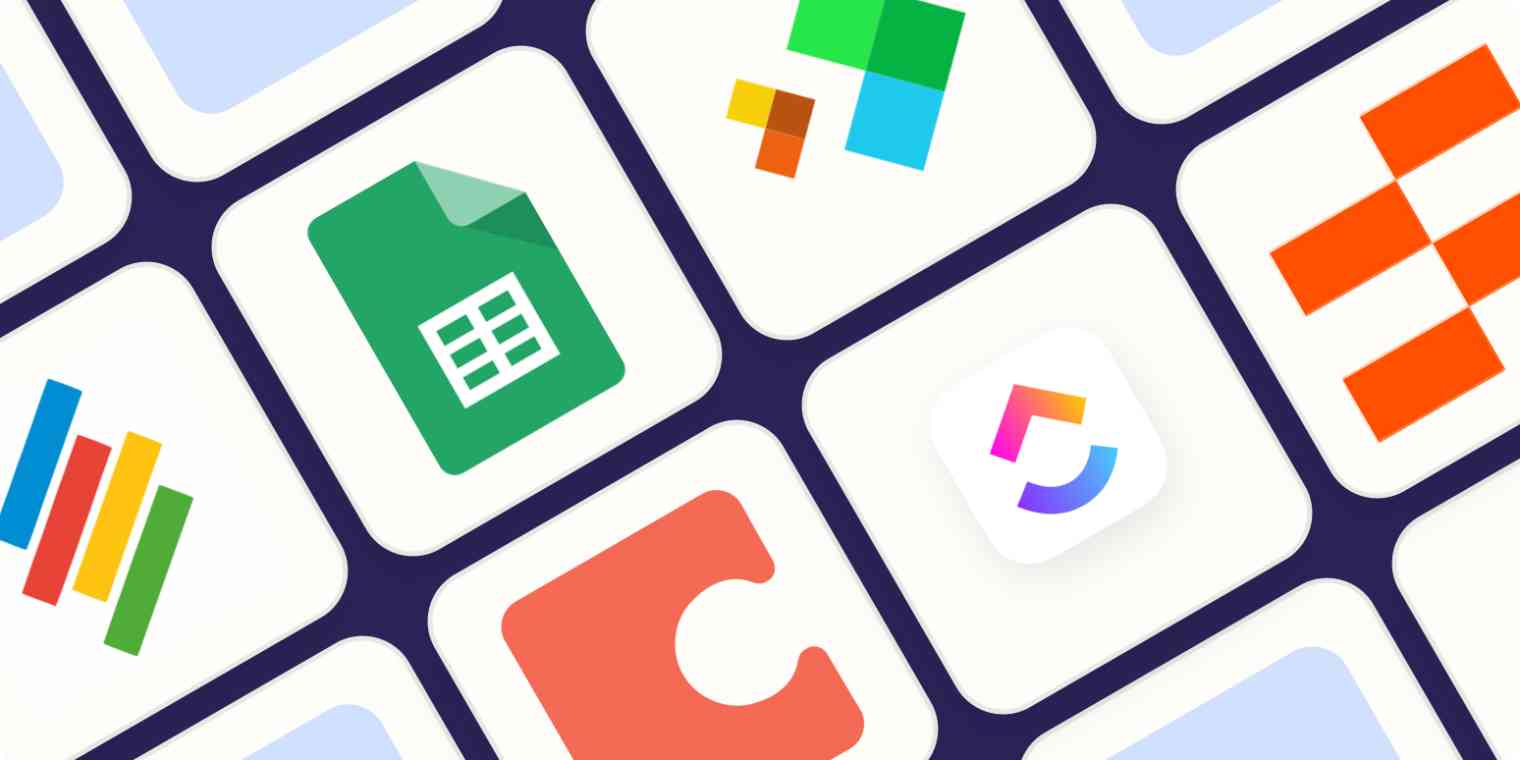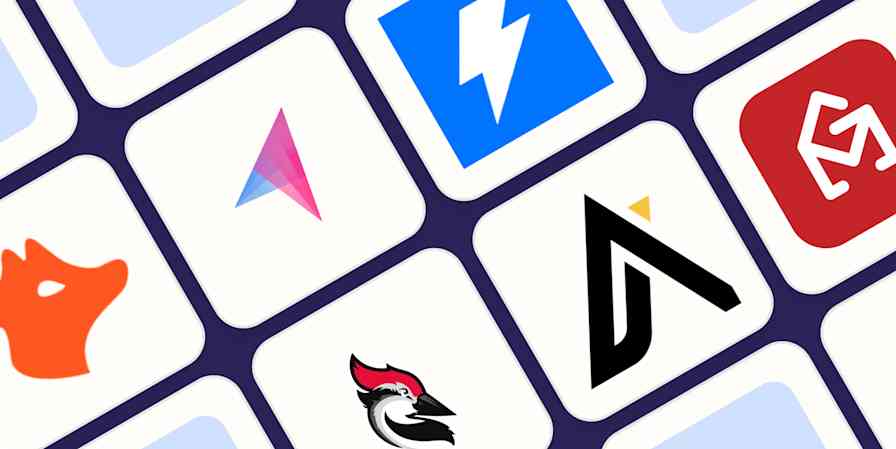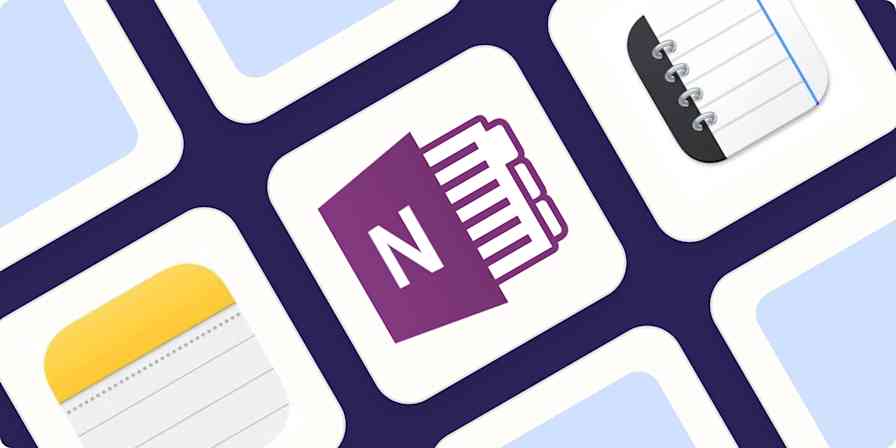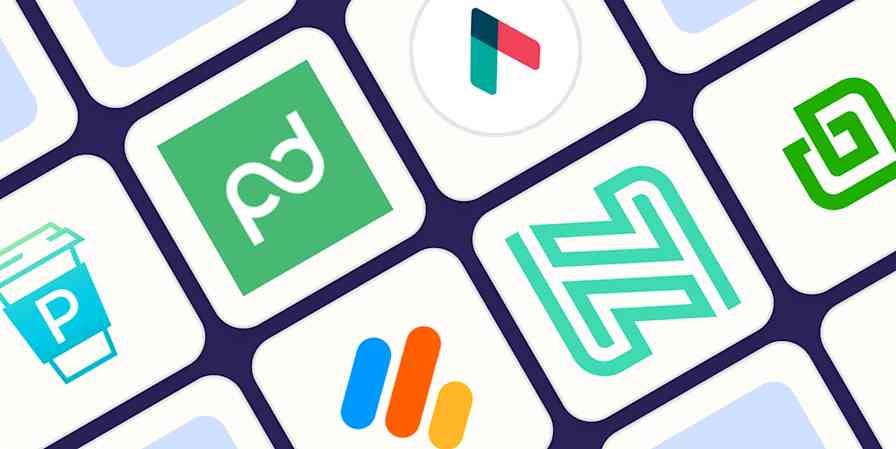Airtable is a great app. If it's the right fit for your team, it's probably worth using, and you don't need to keep reading to find an alternative. But if it's not a perfect fit, and you're looking for something else that has Airtable's database features, powerful automations, and built-in project management—but is just a little bit different for one reason or another—then you've come to the right place.
There are a handful of direct competitors to Airtable, but having tested all of them for this article, I can confidently say that no app quite does Airtable's full feature set as well as Airtable does. But Airtable isn't flawless: it's pretty expensive, it can be tricky to figure out, and if you're not making the most out of its app building, data handling, and automation features, it might just be the wrong tool for your team. It also might lack some key feature you're looking for.
Because Airtable has such a broad feature set and can be configured to do almost anything, there are lots of apps out there that can claim to be an alternative, at least in some ways. I tested almost 40 of them for this list, and while the number of direct competitors is pretty small, there are some great apps that offer a lot of what Airtable does but with a different emphasis, a few extra features, or at a cheaper price. Here are my six favorites.
The best Airtable alternatives
Stackby for an affordable and very Airtable-like alternative
Google Sheets for a free Airtable alternative
Spreadsheet.com for something more like a spreadsheet
ClickUp for project management
Coda for adding documents
Zapier Tables for automation
What makes the best Airtable alternative?
How we evaluate and test apps
Our best apps roundups are written by humans who've spent much of their careers using, testing, and writing about software. Unless explicitly stated, we spend dozens of hours researching and testing apps, using each app as it's intended to be used and evaluating it against the criteria we set for the category. We're never paid for placement in our articles from any app or for links to any site—we value the trust readers put in us to offer authentic evaluations of the categories and apps we review. For more details on our process, read the full rundown of how we select apps to feature on the Zapier blog.
For an app to be a viable Airtable alternative, it has to offer features that allow you to do some (and ideally most) of the things that Airtable does. The features don't have to be identical or work in the exact same way, but the end result should be that you can use the apps somewhat interchangeably.
Sure, Airtable might be better for some uses, and my picks here will be better for others, but I was still looking for apps that met a few key criteria:
Database-like features. At its core, Airtable is a lightweight, user-friendly database. If you can't code your own app using SQL, you can use an Airtable base to build much the same kind of tool. For me, some kind of fairly powerful data handling features were an absolute non-negotiable. Anything short of a very powerful spreadsheet implementation just isn't going to allow you to store and use data like Airtable can.
Powerful automations. Airtable is known for its integrations, automations, and ability to build custom apps (or at least app-like internal tools). Any service that can't pull information from your CRM or a web form, or automatically update your stored data and display it nicely based on some criteria you set, is really missing a key part of what makes Airtable so useful.
Versatility. Airtable can be used to build almost any kind of tool you want. I use an Airtable base to keep track of my article pitches and the publications and editors I want to send them to. Zapier uses it for its editorial calendar, while Taylor's Guitars uses it to run their marketing efforts, and an international retail group uses it to manage its product development. If some off-the-shelf app doesn't meet your needs, odds are you can build something that does using Airtable. While not every app on this list is quite as customizable, I was still looking for versatile, flexible tools that could be put to a variety of uses depending on your needs.
Ease of use. For all that power, once you wrap your head around the basics of databases, Airtable is surprisingly user-friendly. The interface is excellent, it's got great templates, and the help docs are really comprehensive. For an app to make this list, it needed to be roughly as easy to use as Airtable. A bit of complexity is fine if the help docs are good, but I'm not going to recommend tools that allow you to configure your own local SQL database.
Some kind of collaboration. While Airtable can be used solo, it's mostly an app for coordinating data between teams. For an app to make this list, it needed to offer some kind of sharing or collaboration, too. It didn't quite need to be at Airtable's enterprise level, but a team of five or 10 should be able to collaborate and work together using it.
And, of course, I was also looking for some kind of standout reason to use any of these apps over Airtable. It bears repeating: Airtable is a great tool that I use all the time. If you're looking for another app, it's presumably because Airtable isn't doing something you need it to—so I put 40-odd possible Airtable alternatives through their paces to find the best of them.
I've been testing and writing about software for more than a decade, so I have a solid handle on how to assess apps like this. Over the course of about a week, I tried each app and used it to do some of the things I (and others) normally use Airtable for. This included managing schedules, planning workouts, and building a CRM. From that testing, I was able to see which apps really were Airtable alternatives—and which of those were the best.
And now, on to the list.
The best Airtable alternatives at a glance
Best for | Pricing | |
|---|---|---|
A direct alternative that's affordable | Free for 1,500 rows per Stack; from $4/user/month for 3,500 rows per Stack and more features | |
A free option | 100% free | |
A spreadsheet-style alternative | Free for 1 creator, 5 workbooks with up to 1,500 rows, and 100 automation actions per month; from $7/creator/month for unlimited workbooks with up to 5,000 rows and 250 automation actions per month | |
A document-based alternative | Free for unlimited unshared docs with limited automations and integrations; from $10/month/doc maker for unlimited docs, more automations and integrations, and unlimited table syncing between docs | |
Project management | Free for 5 spaces, 100MB of storage, and limited automations; from $7/user/month for unlimited spaces and storage and 1,000 automation executions | |
Automation | Free for Tables Basic; $20/month for Premium with 20 tables and 100,000 records per base; $100/ for Advanced, with 50 tables and 500,000 records per base |
Best affordable Airtable alternative
Stackby (Web, iOS, Android)
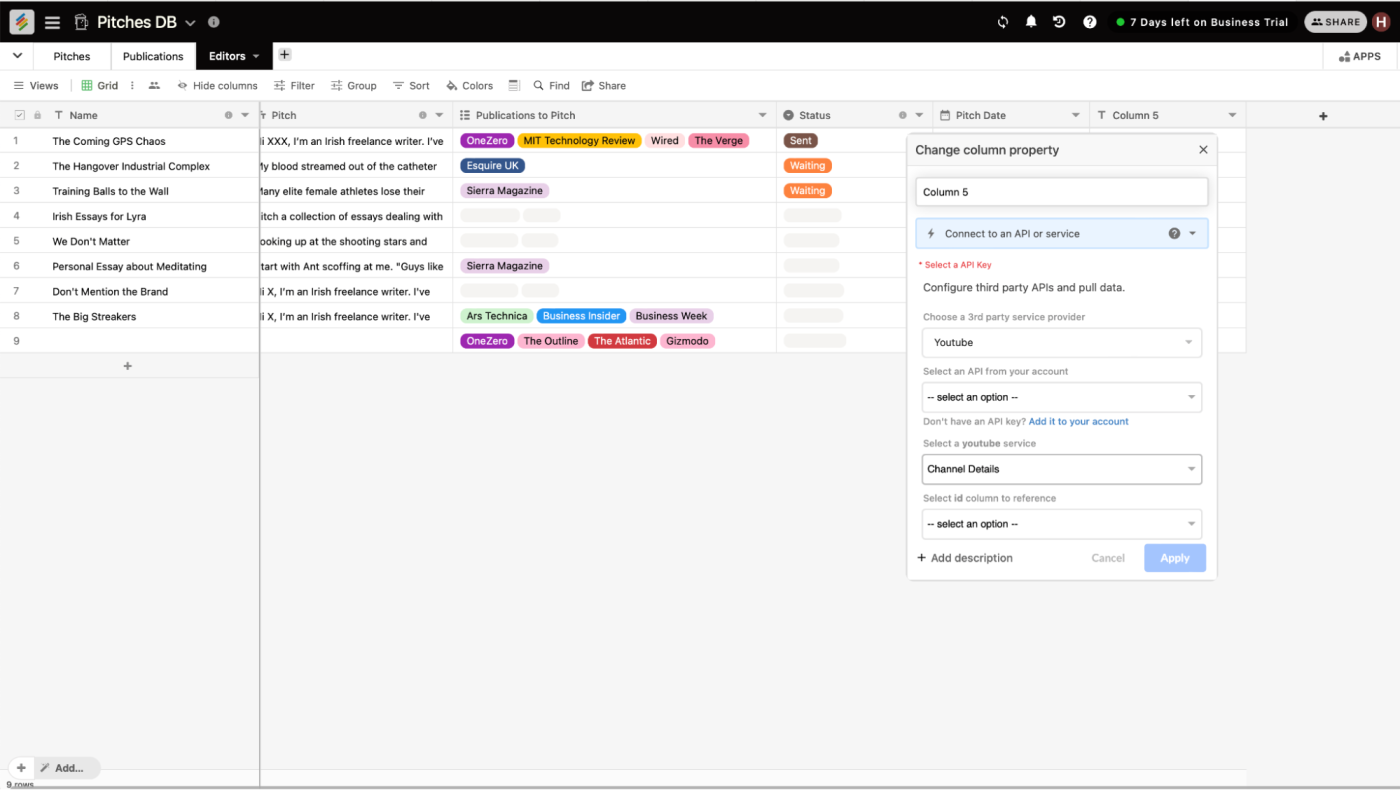
Stackby pros:
For many people, Stackby and Airtable are functionally identical
Stackby is a lot more affordable than Airtable
Stackby cons:
Lacks polish
Stackby is a pretty direct replacement for Airtable. Of course, there are dozens of differences. There are little things, like databases being called Stacks instead of bases. Then there are larger things, like the interface builder being replaced with a series of sidebar apps that can do things like summarize the information in your databases or show charts. And finally, the expected things, like buttons being in different places. There are even a few bonus features, like Stackby's ability to directly connect other services to columns.
But really, these differences don't massively change the fact that both apps are databases with nice user interfaces. Both tools aim to fill much the same role in your organization—and both succeed.
Some people will prefer Airtable or Stackby based on all the small differences (and they're both worth trying if you're looking for a database tool). So the most compelling reason to go with Stackby is pretty simple: it can be significantly cheaper. Airtable's free plan limits you to 1,000 records per month and limited automations. After that, you have to jump up to the $20/user/month (billed annually) Team plan to get up to 50,000 records per base and the $45/user/month plan (billed annually) if you want all of Airtable's features.
Stackby's free plan gets you 1,500 rows per stack, but it has more plans for smaller users. Billed annually, Personal is $4/user/month for 3,500 rows per stack, Economy is $8/user/month for 7,000 rows per stack, and even Business is only $16/user/month for 50,000 rows per stack and Stackby's full feature set. Yep, Stackby's most expensive paid plan costs less than Airtable's cheapest ones.
Having said that, Stackby is a less mature tool than Airtable, and it shows in a few places. The overall experience was a bit slower, and I encountered a few bugs—for example, the sidebar apps I mentioned earlier wouldn't add or load a few times when I was testing them. I also found Stackby's interface to be less polished and its automation features a bit less intuitive to use, though that might just be because I'm a regular Airtable user.
Like Airtable, Stackby integrates with Zapier, so you can do things like automatically add data to it from all the other apps in your tech stack. Here are some examples to get you started.
Stackby price: Free for 1,500 rows per Stack; from $4/user/month (billed annually) for Personal with 3,500 rows per Stack and more features.
SmartSuite is another app that's pretty similar to Airtable, but I found Stackby offered a better user experience. It's still worth checking out, though.
Best free Airtable alternative
Google Sheets (Web, iOS, Android)
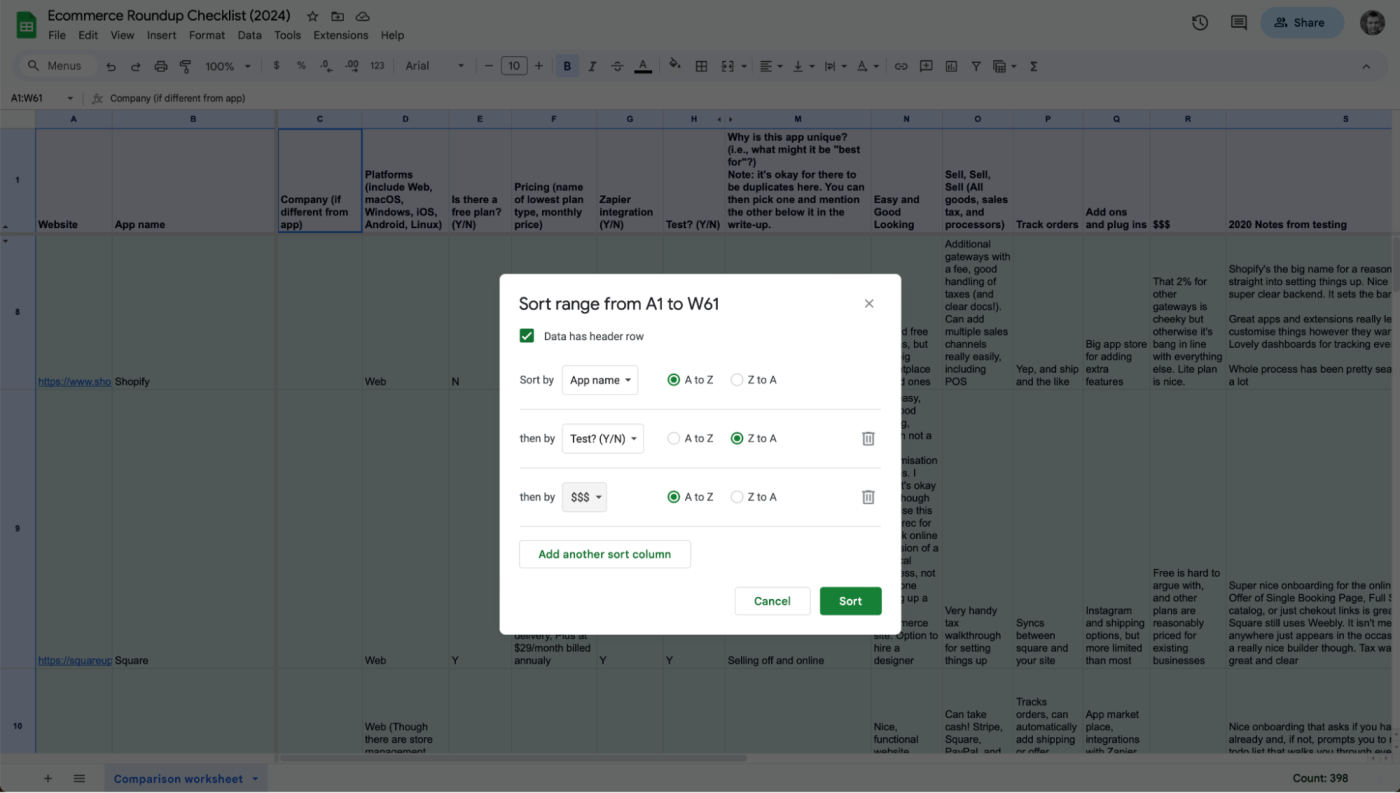
Google Sheets pros:
Completely free
Familiar interface
Google Sheets cons:
It's similar enough to Airtable to be used to do many of the same things, but still a different style of app (spreadsheet, not database)
In Zapier's head-to-head look at Airtable vs. Google Sheets, it says comparing Google Sheets and Airtable is a lemons-to-oranges situation—kind of the same thing, but not really. So what's Google Sheets doing on this list?
Well, Google Sheets has one huge thing going for it: it's free. You can work with huge quantities of data and collaborate with dozens of people, all without entering a single credit card number. And for all that, you can use it to build many of the same kinds of tools and workflows as you can with Airtable.
Because it's a spreadsheet app and not a database, sorting and working with data requires a touch more effort, but it's still possible. It has great integrations and automations and even has its own programmable macro system. You'll probably have to do some Googling to find instructions if you really want to push Sheets to its limits, but it's incredible how much you can do with it.
Beyond that, Sheets obviously integrates with the rest of Google's ecosystem, which you may already be using. It can also be used with Google AppSheet (which is free if you have fewer than 10 users) to build more complex apps, like project trackers, incident report management systems, and scheduling tools.
And it also integrates with Zapier, so you can do things like save email attachments to a Sheet, or even send emails when something gets updated. Learn more about how to automate Google Sheets, or get started with one of these pre-made workflows.
Save new Gmail emails matching certain traits to a Google Spreadsheet
Send emails via Gmail when Google Sheets rows are updated
Google Sheets price: Free
If you already use another spreadsheet app like Microsoft Excel or Zoho Sheet, that will probably work almost as well.
Best Airtable alternative that's more like a spreadsheet
Spreadsheet.com (Web)
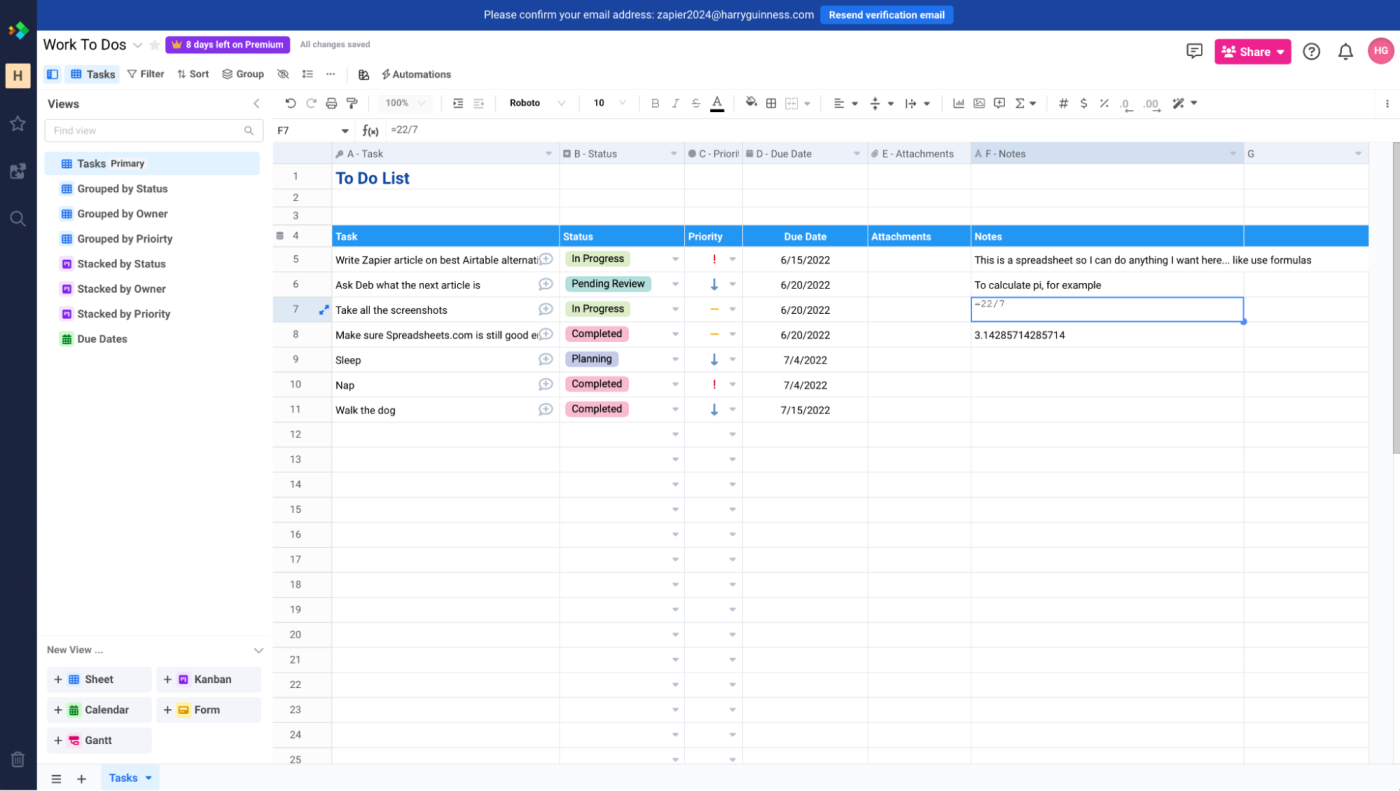
Spreadsheet.com pros:
Many of Airtable's best features with a spreadsheet spin
Solid free plan to get started with
Spreadsheet.com cons:
Lots of teams will quickly outgrow the more affordable plans
Sometimes you want a database, but sometimes you want a spreadsheet. The simplest way to understand the difference is that in a database like Airtable, you can only operate on information by column. Every row has the same fixed structure with the same variables. It's great for keeping data strictly organized, but it gives up a lot of flexibility.
With a spreadsheet, you can more easily do what you want. Instead of having to work with data by column, you can operate on information by cell. It doesn't matter if the label at the top of a column says Date; if you want to, you can throw a formula into any row and have it calculate your net profit for the quarter.
Spreadsheet.com was the best of the spreadsheet-style Airtable competitors I tested. It has a lot of the high-level features that Airtable does, like great integrations and automations, easy collaboration, and the ability to build apps and interfaces. But instead of using a database to handle your data, it uses a spreadsheet.
This means that you can use Spreadsheet.com to build the same kind of tools, store the same kind of information, and manage the same kind of projects as Airtable, but with something that feels more similar to Excel or whatever spreadsheet app you're used to. If that sounds like what you're looking for, it's the tool to look at.
Spreadsheet.com also integrates with Zapier, so you can connect it to thousands of other apps. Here are a couple of examples to give you an idea.
Create detailed events in Google Calendar from new Spreadsheet.com rows
Send Slack channel messages for newly updated Spreadsheet.com rows
Spreadsheet.com price: Free for 1 creator, 5 workbooks with up to 1,500 rows, and 100 automation actions per month; from $7/creator/month (billed annually) for unlimited workbooks with up to 5,000 rows and 250 automation actions per month.
Smartsheet is another similar tool, though it feels more like a project management app (and it's marketed that way, too). Check it out if that's what you're looking for.
Best document-based Airtable alternative
Coda (Web, iOS, Android)
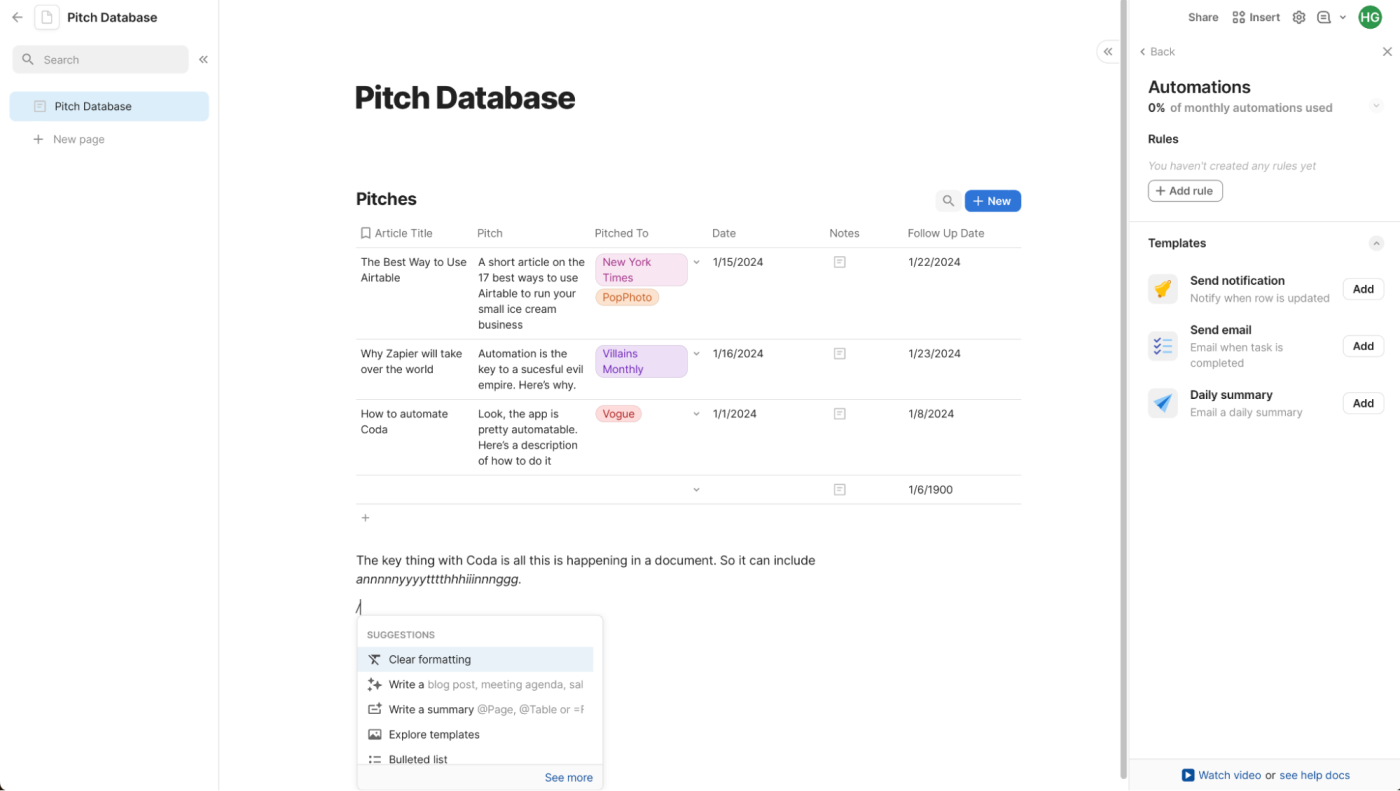
Coda pros:
If you mostly want a document-based app with the option to have a database or two, Coda's tables work great
Coda cons:
If you really want a database-based app, it's not the option to choose
Airtable is great if you want to run your business and plan everything through table-like databases. But even if you're an Airtable superuser, you'll most likely need another document app for handling things like meeting notes, product briefs, and other text- or image-heavy documents. But what if you could get by with just one app? That's where Coda comes in.
Coda is a collaborative project management app that feels pretty similar to Airtable, except it relies on documents instead of bases to organize everything. But as part of any doc, you can add a surprisingly robust table that works similarly to Airtable's bases. Columns can reference other tables in different documents, you can add information using integrations with Zapier and other apps, and you can perform complex calculations. On higher plans, tables and action buttons can also sync automatically between docs. I'd say that like for like, you can probably do 80% of what you can with Airtable with Coda's tables, even if setting things up is a touch less intuitive—and you might need to be on a higher plan to get all the features you need.
Of course, 80% is only good if you're also looking for the rest of what Coda offers: an all-in-one collaborative workspace for your team. It's a good choice if you mostly work with documents but want to occasionally manage some aspect of a project using a database. But if you're looking for a database-first app, it's not the best choice.
Coda integrates with Zapier, so you can add rows to a table directly from all the other apps you use. Learn more about how to automate Coda, or get started with one of these pre-made workflows.
Create rows in Coda docs when new messages are posted to Slack channels
Coda price: Free for unlimited unshared docs with limited automations and integrations; from $10/month/doc maker (billed annually) for unlimited docs, more automations and integrations, and unlimited table syncing between docs.
Notion is a similar app with tables that can work kind of like databases, but its databases aren't as advanced. For a full rundown of how it stacks up to Airtable, check out the head-to-head: Notion vs. Coda.
Best Airtable alternative for project management
ClickUp (Web, iOS, Android)
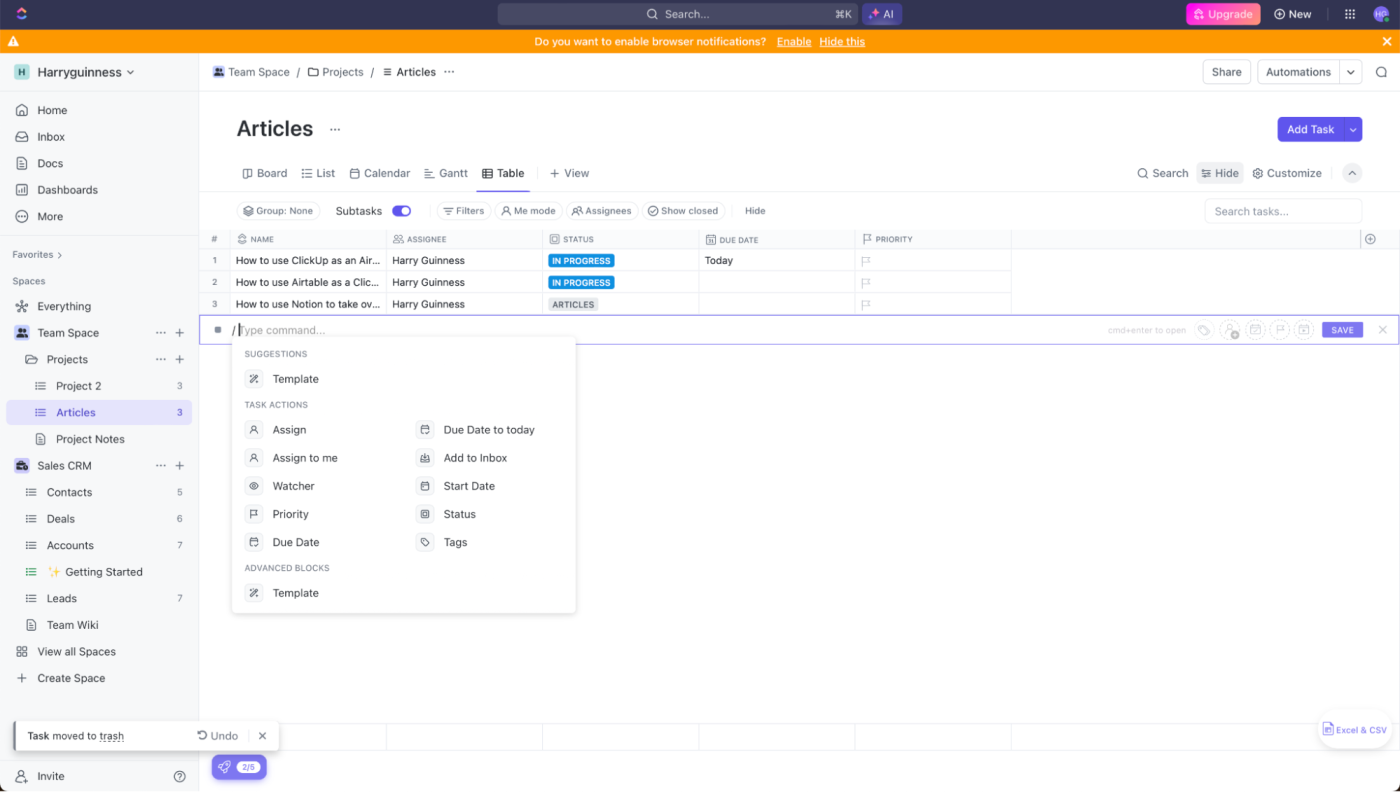
ClickUp pros:
ClickUp's tables are usable as a database, once you get over every row being referred to as a task
ClickUp cons:
Still primarily a project management tool; if you really want a database app, it isn't the right pick
Despite its origins as a database tool, Airtable has become an incredibly popular project management app. Depending on how you set it up, it can be used to manage your team's tasks and goals, keep track of your project roadmaps, store important files and assets, and handle almost every aspect of any given project.
With that said, it doesn't have the full project management features of a dedicated app. If you want things like time tracking, team chat, more ways to view your projects, and, really, just an overall focus on project management, then you need an app like ClickUp.
Like Coda, ClickUp isn't a like-for-like Airtable competitor, but it has a robust tables feature that you can do enough with that there's a lot of overlap. Projects can be viewed as both a table and a list, which allow you to add database-like columns to each task. It's a bit odd that each row is called a task regardless of whether it's actually a job for someone to do, contact details for a potential customer, or anything else—but it's not as if it stops you using the app. Despite the odd naming conventions, you can automate the various different fields for each task, perform database-like operations, and generally build a lot of the tools you can with Airtable—especially if you use one of the many built-in templates to give you a head start.
If you primarily want a project management app but also need a tool that can be used to build a CRM or get simple asset sharing set up, ClickUp is well worth a look. If your team heavily relies on Airtable, it's unlikely to be a replacement, but if you only use Airtable for a handful of features, you can probably recreate most of what you need.
ClickUp also integrates with Zapier, so you can create tasks from the other apps you use most. Learn more about how to automate ClickUp, or get started with one of these pre-made templates.
Add starred Gmail emails as tasks in ClickUp [Business Gmail Accounts Only]
Create ClickUp tasks for new Google Forms responses
ClickUp price: Free for 5 spaces, 100MB of storage, and limited automations; from $7/user/month (billed annually) for unlimited spaces and storage and 1,000 automations executions.
monday.com is a similar project management app that's worth a look. ClickUp just felt closer to Airtable as I was testing both of them. To learn more about monday.com, take a look at Zapier's comparison: ClickUp vs. monday.
The best Airtable alternative for automation
Zapier Tables (Web)
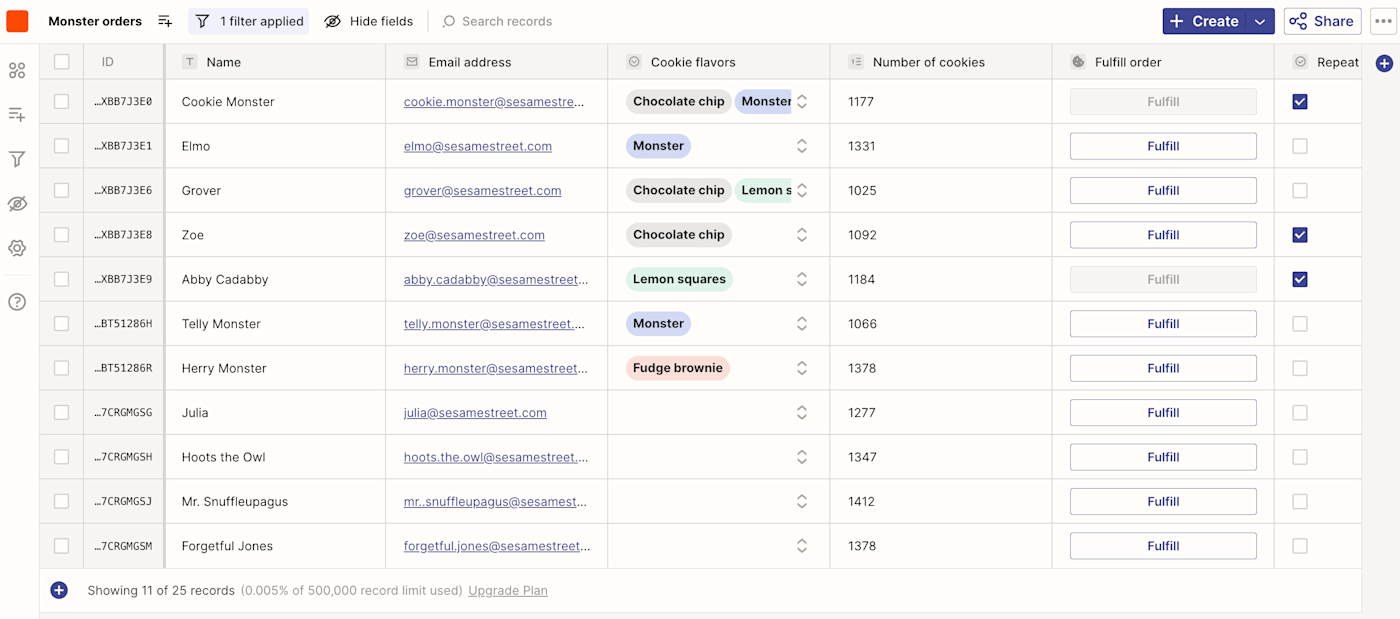
If you're looking for a database that can pull and send data from thousands of sources automatically—or at the click of a button—then Zapier Tables is where to start. (And yes, this is the Zapier blog, so try it out yourself to see why it's worthy of inclusion here.)
As a product built into Zapier, there are a couple of downsides. It's not quite as robust as Airtable, at least not for everything. Zapier Tables can handle fewer data types, for example, and there are fewer templates and ways to see your data. Similarly, while you can link records between tables using Zaps, it's more complicated than using multiple tables in the same base as you would with Airtable.
But simplicity is one of the benefits here. Everything is streamlined, without losing out on the power of being able to connect your database with 6,000+ other apps.
While Zapier has a free plan, you're limited to 100 tasks per month. If you want to automate more, you'll need at least the starter plan, at $19.99/month (billed annually), and if you want to collaborate with other users, then you need a Team plan, at $69/month (billed annually). On top of that, you're likely to also need Tables Premium (to get more than 10 tables), and Interfaces Premium (to build out custom apps); they each cost an extra $20/month.
All in all, if you're already using Zapier or know you're really going to be automating data collection and management from multiple different sources, then Tables is absolutely worth a look. Start with one of the pre-built templates to get a feel for how it works.
Zapier Tables pricing: Free for Tables Basic; $20/month for Premium with 20 tables and 100,000 records per base; $100/ for Advanced, with 50 tables and 500,000 records per base
Other possible Airtable alternatives
With so many possible apps you can use as an alternative for at least some of what Airtable offers, there are plenty of options that didn't make this list. Sometimes it was because an app was just plain bad, but other times, it was because it just didn't tick all the boxes I was looking for. Here are a handful of the latter—Airtable alternatives that are worth checking out but didn't quite make the cut.
SmartSuite, like Stackby, is another direct competitor to Airtable. I ran into a few bugs and didn't like the overall experience as much, but it's another affordable option that can be worth looking at.
Fibery is a bit like a hybrid between Airtable and Notion, with some more task management features thrown in. If you really want one app that does everything, give it a look.
Baserow is an open source Airtable alternative. It's not quite as feature-filled, but it can be a viable option for some teams. And if you're prepared to host it yourself, it can be super affordable.
For the list above, in most categories, I went for the app that felt the most like Airtable. But Smartsheet, Notion, and monday.com are all great apps that came super close to making the list. Spreadsheet.com, Coda, and ClickUp just gave me more Airtable-y vibes.
While Airtable is a no-code database tool that allows you to build apps for you and your team, Xano is a no-code database tool that allows you to build with other no-code tools. If that's actually what you're looking for, check it out.
Related reading:
